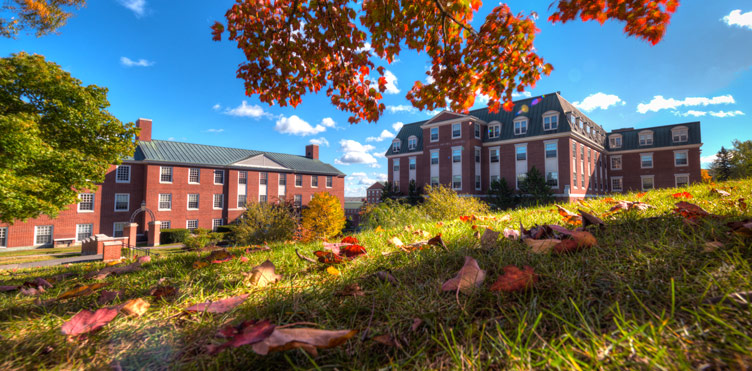Total undergraduates
10,438
International tuition fee
$25,000
School address
3 BAILEY AVE
Online or distance education
Yes
Conditional admission
Yes
Number of graduate programs
72
Number of undergraduate programs
150
Number of students
11,000
Number of graduate students
5,000
Number of undergraduate students
10,000
Quick facts about our school
The University of New Brunswick (UNB) is a renowned Canadian institution located in Fredericton, New Brunswick. Founded in 1785, it is the oldest English-language university in the country and has a rich history of academic excellence and innovation. UNB offers a wide range of undergraduate and graduate programs across various disciplines, including engineering, business, science, and the arts. The university is known for its strong research culture and has state-of-the-art facilities to support cutting-edge research in areas such as cybersecurity, biomedical engineering, and renewable energy.
UNB is a vibrant and welcoming community that provides students with opportunities for personal and academic growth. With a commitment to experiential learning and community engagement, UNB offers students numerous opportunities to participate in internships, co-op programs, and research projects that enhance their educational experience. The university's picturesque campus, situated along the majestic Saint John River, provides a scenic backdrop for academic pursuits and is home to a diverse student body from around the world. Recognized for its student-centered approach to learning and its supportive faculty, UNB continues to be a top choice for students seeking a quality education in a welcoming environment.
School highlights
Life at our school
Life at the University of New Brunswick is a vibrant and engaging experience for students. The university offers a diverse range of academic programs and extracurricular activities to enrich students' educational and personal growth. The campus itself is a bustling hub of activity, with modern facilities, green spaces, and a strong sense of community among students and faculty.
Students at the University of New Brunswick have the opportunity to engage in research projects, student clubs, sports teams, and volunteer activities. The university also hosts various events, guest speakers, and cultural celebrations throughout the year, creating a lively and inclusive atmosphere on campus. With its supportive environment and emphasis on academic excellence, the University of New Brunswick provides students with a well-rounded and enriching university experience.
The University of New Brunswick (UNB) is a reputable institution known for its commitment to academic excellence and innovative research. Founded in 1785, UNB is Canada's oldest English-language university and has a rich history of fostering a vibrant learning community. With campuses located in Fredericton and Saint John, UNB offers a wide range of undergraduate and graduate programs across various disciplines, providing students with the opportunity to engage in cutting-edge research and hands-on learning experiences. The university's dedicated faculty and staff are known for their expertise and mentorship, supporting students in their academic pursuits and personal growth. UNB's emphasis on interdisciplinary collaboration and community engagement has helped shape the next generation of leaders and innovators, making it a respected institution in the Canadian educational landscape.
The University of New Brunswick (UNB) is committed to promoting a sustainable future through various initiatives and programs. With a focus on environmental conservation, social responsibility, and economic viability, UNB strives to be a leader in sustainable practices within the university community and beyond. Through research, education, and community engagement, UNB aims to raise awareness about the importance of sustainability and to inspire positive change towards a greener and more sustainable future. By incorporating sustainability into its operations, curriculum, and campus culture, UNB is working towards creating a better world for future generations.
The Overview Vision at the University of New Brunswick is to be a recognized leader in transformative education, discovery, and innovation that makes a positive impact on the world.
Some key points related to this vision include:
- Providing students with exceptional learning experiences that prepare them for success in a rapidly changing world
- Fostering a culture of research and innovation that tackles global challenges and drives economic growth
- Creating a diverse and inclusive community that values collaboration, creativity, and excellence
- Engaging with local and global partners to address societal issues and promote sustainable development
- Embracing technology and digitalization to enhance teaching, learning, and research outcomes.
At the University of New Brunswick, students can expect a vibrant campus experience filled with academic opportunities, extracurricular activities, and a supportive community. The campus is located in two cities, Fredericton and Saint John, offering a unique blend of urban amenities and natural beauty. Students have access to state-of-the-art facilities, including modern classrooms, research labs, and libraries. The university also hosts a variety of events, clubs, and organizations, allowing students to connect with their peers and pursue their interests outside of the classroom. Overall, the campus experience at the University of New Brunswick is characterized by academic excellence, a strong sense of community, and countless opportunities for personal and professional growth.
Programs offered at our schools
The University of New Brunswick offers a wide range of programs for both undergraduate and graduate students. With over 75 undergraduate programs, students can choose from various disciplines including arts, sciences, business, engineering, and many more. The university also offers over 50 graduate programs for students looking to further their education and specialize in their field of interest.
UNB prides itself on its innovative and interdisciplinary approach to education, preparing students for successful careers in a rapidly changing world. With a focus on research and experiential learning, students have the opportunity to gain hands-on experience and work closely with faculty members on cutting-edge research projects. Whether students are looking to pursue a Bachelor's degree or a Master's degree, the University of New Brunswick provides a supportive and engaging learning environment to help students reach their full potential.
The University of New Brunswick (UNB) is a prestigious institution known for its commitment to academic excellence and innovative research. The university offers a wide range of programs and opportunities for students to pursue their passions and achieve their academic goals. Admission to UNB is competitive, with high academic standards and requirements for prospective students. Applicants are evaluated based on their academic achievements, extracurricular activities, letters of recommendation, and personal statements. Upon admission, students have access to a supportive and vibrant campus community, with resources and support services to help them succeed in their academic pursuits. The University of New Brunswick is a leading institution that provides a transformative educational experience for students from around the world.
The University of New Brunswick (UNB) offers a comprehensive undergraduate admissions process for prospective students looking to pursue higher education. With campuses in Fredericton and Saint John, UNB provides a diverse range of programs in various fields of study, ensuring that students have a wide array of options to choose from. The admissions process at UNB takes into consideration academic achievements, extracurricular activities, and personal statements, aiming to select students who demonstrate both academic excellence and a strong potential for growth and contribution to the university community. For students interested in pursuing their undergraduate studies at a reputable institution known for its academic excellence and vibrant campus life, the University of New Brunswick is a compelling choice.
The University of New Brunswick (UNB) offers a vibrant undergraduate admissions program for students looking to pursue their higher education in a diverse and inclusive environment. As one of Canada's oldest universities, UNB prides itself on providing a high-quality education through innovative programs, research opportunities, and a supportive community. With a wide range of undergraduate programs to choose from, students can explore their interests and expand their knowledge in fields such as engineering, business, health sciences, and more. The admissions process is designed to be accessible and transparent, ensuring that all prospective students have the opportunity to showcase their strengths and qualifications for admission.
UNB's undergraduate admissions team is dedicated to helping students navigate the application process and make informed decisions about their academic futures. Whether you're a high school student looking to start your university journey or a transfer student seeking a new opportunity, UNB welcomes students from diverse backgrounds and experiences to join its vibrant community. From personalized support to campus resources, UNB is committed to providing a world-class education that empowers students to succeed and thrive in their chosen fields.
The University of New Brunswick offers a variety of graduate programs for students interested in furthering their education and research. The admission process for graduate programs at UNB typically involves several steps, including submitting an online application, providing academic transcripts, letters of recommendation, a statement of interest, and any additional requirements specific to the program.
Here are a few key points related to graduate admissions at the University of New Brunswick:
- The general admissions requirements for graduate programs at UNB include a bachelor's degree from a recognized institution, a minimum GPA requirement, and English language proficiency for international students.
- Each graduate program at UNB may have specific requirements and deadlines, so it is important for applicants to review the program's website for detailed information.
- Some programs may require additional materials, such as a writing sample, portfolio, or GRE/GMAT scores, so applicants should carefully review the program's admission requirements.
- The application process for graduate programs at UNB is typically done online through the university's admissions portal, where applicants can submit all required documents and track the status of their application.
- Once all required materials are submitted, the admissions committee will review the application and make a decision on acceptance. Applicants can expect to receive an email notification regarding their admission status.
- International students may have additional requirements, such as proof of English language proficiency through tests like IELTS or TOEFL.
Overall, the University of New Brunswick offers a competitive and comprehensive graduate admissions process for students looking to further their education and career prospects. Applicants should carefully review the specific requirements for their program of interest and ensure all materials are submitted on time to increase their chances of admission.
The University of New Brunswick (UNB) is a prestigious institution in Canada with a rich history of academic excellence. Admission requirements vary depending on the program and level of study. For undergraduate programs, applicants typically need to have completed high school with a minimum GPA, as well as meet specific course prerequisites. Additionally, students may need to submit standardized test scores, letters of recommendation, and a personal statement or essay.
For graduate programs, applicants generally need a bachelor's degree from a recognized institution, along with relevant work experience and strong letters of recommendation. Some programs may also require GRE or GMAT scores, a research proposal, and an interview. International students may need to demonstrate English proficiency through tests like IELTS or TOEFL. Overall, UNB seeks to admit students who demonstrate academic potential and a strong commitment to their chosen field of study.
The University of New Brunswick has an admission deadline of March 31st for most undergraduate programs. It is important for prospective students to submit their applications by this deadline in order to be considered for admission to the university. The application process typically involves submitting high school transcripts, letters of recommendation, a personal statement, and any additional required documents. Late applications may be considered, but it is best to adhere to the March 31st deadline to ensure that all materials are received and reviewed in a timely manner. Students are encouraged to reach out to the university's admissions office if they have any questions or concerns about the application process or deadline.
At the University of New Brunswick, there are various scholarships and financial aid opportunities available to help students fund their education. The university offers merit-based scholarships to undergraduate students based on academic achievement, as well as financial need-based bursaries to assist those facing financial hardship. Some of the scholarships at UNB include entrance scholarships for incoming students, in-course scholarships for current students, as well as specific scholarships for students in various programs or those involved in extracurricular activities. Additionally, the university provides assistance through government student loans, work-study programs, and emergency funding options for students in unexpected financial crises. With these resources, the University of New Brunswick aims to make higher education accessible and affordable for all students.
-
International students
-
Canadian students
-
Provincial students
Notes for the international students
See scholarships and other financial award programs on our website Also, see employment opportunities available to our international students
Keep in mind that the above are just rough estimates; the actual tuition fees vary widely, depending on many factors For a better estimate for YOU, please contact us
Managing finances as a student at University of New Brunswick requires careful planning and budgeting. First and foremost, it is important to create a budget that outlines your income sources, such as scholarships, part-time work, or financial aid, and your expenses, including tuition, textbooks, rent, food, and other living costs. By tracking your spending and comparing it to your budget regularly, you can identify areas where you may need to cut back and save money.
Additionally, take advantage of student discounts and perks offered on campus and in the community to make your money go further. Consider buying used textbooks, cooking meals at home instead of dining out, and using public transportation or carpooling to save on transportation costs. It is also helpful to set aside some money each month in a savings account for emergencies or unexpected expenses. By being mindful of your spending and making informed financial decisions, you can successfully manage your finances as a student at University of New Brunswick.
Remember to also utilize resources available at the university, such as financial aid advisors and workshops on financial literacy, to gain more insight and guidance on managing your finances effectively. By taking proactive steps and staying disciplined with your budget, you can reduce financial stress and focus on your academic success during your time at University of New Brunswick.
At the University of New Brunswick, students have the option to work both on-campus and off-campus to support themselves while studying. On-campus work opportunities are available within the university itself, such as working in the library, student center, cafeteria, or as a research assistant for faculty members. These positions offer flexible hours and are often well-suited for balancing work with academics.
For off-campus work, students can explore part-time job opportunities in the local community. Popular options include retail, food service, tutoring, and internships in various industries. Many students also opt for work-study programs or co-op placements that provide hands-on experience in their field of study while earning a competitive salary. Additionally, UNB has a Career Development and Employment Centre that helps students find job opportunities both on and off campus.
Overall, the University of New Brunswick offers a range of work options for students to earn income while pursuing their studies, allowing them to gain valuable experience, develop new skills, and build a strong foundation for their future career endeavors.
Where does the financial assistance come from? Universities, the federal, provincial and territorial governments, individual schools, some businesses and charitable foundations give out bursaries and scholarships. Amazingly enough, over 100,000 scholarships are awarded every year, with many millions of dollars of available funds still going unclaimed because no one applies. Whether you are Canadian or an International student, you can apply for Bursaries and Sponsorships for a range of undergraduate, graduate, doctoral and post-doctoral courses at a wide range of universities so why not check with your chosen school when you apply?
If you are looking for a scholarship or financial aid for your studies, there are literally hundreds of online sources, with both government funding and private funds available. What you don’t want to fall victim to is some sort of scam, which may ask you to pay for the service of applying for a scholarship or even asking you for some sort of deposit. Here are some useful tips if you want to avoid scamming altogether.1- Remember - no authorised and responsible institution will charge you anything for enquiring about financial aid, or for applying for funds. 2- Money up front/ Application Fee - Never send money up front for an application fee - if you are asked to do so, this is definitely a scam!.3- Loan Fees - When applying for a loan, if a company asks you for a loan fee before they will release the money to you, don't go through with it. Companies add fees to your loan balance and would never ask you to pay upfront.4- Guaranteed Scholarships - There is no such thing as a guaranteed scholarship and any company that says they will guarantee you one on payment of a fee will never get back to you. 5- Company/ Scholarship Names - If you see a scholarship service or company that is using words like 'official', 'national', 'government' or other governmental or official sounding names be careful. They are most probably trying to sound official to cover up the scam.6- Phishing schemes - It may be that you get an email, a phone call or an SMS message, asking you for details like your name, address, social security number etc, along with a link to an application form on a website. This is actually a “phishing site” designed to steal your information. In general, you should never give your personal details to anyone, unless you trust them implicitly!.7- Lottery-based scholarships - If you are asked to complete a survey in return for entry into a prize draw (the prize being a scholarship) be very careful. The company providing the scholarship is making money off the information you provide by selling it to third parties. Your chances of winning are very slim and are not based on merit.8- Ask yourself, 'Is it too good to be true?' Although you may want to believe that your dream has just come true, use your common sense and do some research on the organisation involved.9- In general, never pay money - Things like application fees and service fees will be free for legitimate scholarships and you will never be asked to pay money.10- Check them out - If you have a scholarship offer that is asking for money up front, contact them personally. Real companies will be transparent in their services, location etc while scammers will usually be hard to get hold of.Lastly, always make sure that you are applying to an authorised university and that you go through their official channels when you send your personal details. You can find a comprehensive list of secondary education institutions on UniRank
Studying at the University of New Brunswick involves various financial considerations. Tuition fees, accommodation costs, textbooks, and other living expenses are all factors that students need to take into account when planning for their education. The University of New Brunswick offers scholarships, bursaries, and work-study programs to assist students in managing their expenses. Additionally, students may also consider part-time work opportunities on and off-campus to supplement their income. Financial planning and budgeting are essential skills for students to ensure they can successfully navigate the expenses associated with studying at the University of New Brunswick.
The University of New Brunswick offers entrance scholarships to incoming undergraduate students based on academic achievement, extracurricular involvement, and community service. These scholarships are awarded to recognize and reward students who have demonstrated exceptional academic ability and potential.
To be eligible for entrance scholarships at UNB, students must apply for admission and submit their high school transcripts and other supporting documents by the specified deadline. Scholarship amounts and criteria vary, with some scholarships being renewable for additional years based on academic performance. These awards can help offset the cost of tuition and provide financial support to students as they embark on their university journey at UNB. Overall, the entrance scholarships at the University of New Brunswick highlight the institution's commitment to supporting and rewarding outstanding student achievement.
At the University of New Brunswick, entrance scholarships are available to incoming undergraduate students who demonstrate exceptional academic achievement and leadership potential. These scholarships are awarded based on a combination of high school grades, standardized test scores, and extracurricular activities. The university offers a range of entrance scholarships to attract and support talented students from diverse backgrounds.
Students applying to the University of New Brunswick are automatically considered for entrance scholarships upon submission of their application. These scholarships can cover a portion or the full cost of tuition, allowing students to focus on their studies and make the most of their university experience. The university's entrance scholarships not only recognize academic excellence but also aim to foster a community of motivated and engaged learners who will contribute positively to the campus and beyond.
The University of New Brunswick offers a variety of merit scholarships to incoming students based on their academic achievements and other accomplishments. These scholarships are awarded to students who demonstrate exceptional performance in areas such as academics, leadership, community involvement, and extracurricular activities. Merit scholarships at UNB can help reduce the financial burden of pursuing higher education and provide recognition for students' hard work and dedication.
In terms of academic performance, the average percentage required for merit scholarships at the University of New Brunswick varies depending on the specific scholarship program. Generally, students with high academic achievement, typically in the range of 80% or above, are more likely to be eligible for merit scholarships. However, it's important for students to check the specific requirements and criteria for each scholarship program at UNB to determine their eligibility and maximize their chances of receiving financial support for their education.
At the University of New Brunswick, scholarships play a crucial role in supporting students' academic pursuits and helping to alleviate financial burdens. These scholarships are made possible by generous donors who contribute funds to assist students in achieving their educational goals. Scholarship donors may include alumni, faculty members, community organizations, corporations, and individual philanthropists who are dedicated to investing in the future success of UNB students.
Through the contributions of these donors, scholarships can provide students with valuable financial support, recognition for their achievements, and the opportunity to pursue their studies without the constraints of financial barriers. Donors play a significant role in fostering a culture of philanthropy and academic excellence at UNB, empowering students to excel in their academic endeavors and make a positive impact in their communities and beyond.
At the University of New Brunswick, scholarships are awarded to students based on academic achievement, leadership qualities, and financial need. These scholarships are intended to support students in pursuing their education and to alleviate the financial burden associated with attending university. The funds from scholarships can be used to cover tuition fees, textbooks, and other educational expenses. By offering scholarships, the University of New Brunswick aims to recognize and reward outstanding students, encourage academic excellence, and provide opportunities for students to further their education and achieve their full potential.
The University of New Brunswick (UNB) offers a variety of scholarships to support and recognize the academic achievements of its students. These scholarships serve as a way to reward students for their hard work and dedication, while also providing financial assistance to help alleviate the burden of tuition fees. By offering scholarships, UNB aims to attract and retain high-achieving students, fostering a culture of excellence and innovation within the university community. Additionally, scholarships at UNB can help students pursue their education without the constraints of financial limitations, enabling them to focus on their studies and achieve their academic goals. Overall, scholarships at the University of New Brunswick play a crucial role in supporting and empowering students in their pursuit of higher education.
The University of New Brunswick has multiple campuses, with the main campuses located in Fredericton and Saint John in New Brunswick, Canada. To contact the main Fredericton campus, you can reach them at 506-453-4666 or toll-free at 1-800-903-7707. The address for the Fredericton campus is 3 Bailey Drive, Fredericton, NB, E3B 5A3, Canada. For the Saint John campus, you can contact them at 506-648-5500 or toll-free at 1-800-333-8862. The address for the Saint John campus is 100 Tucker Park Road, Saint John, NB, E2L 4L5, Canada.
Both campuses also have specific email addresses for general inquiries and admissions information. For the Fredericton campus, you can email info@unb.ca, and for the Saint John campus, you can email unbsj@unb.ca. Additionally, you can visit the University of New Brunswick's official website at www.unb.ca for more detailed contact information, including specific department contacts and additional campus locations.





